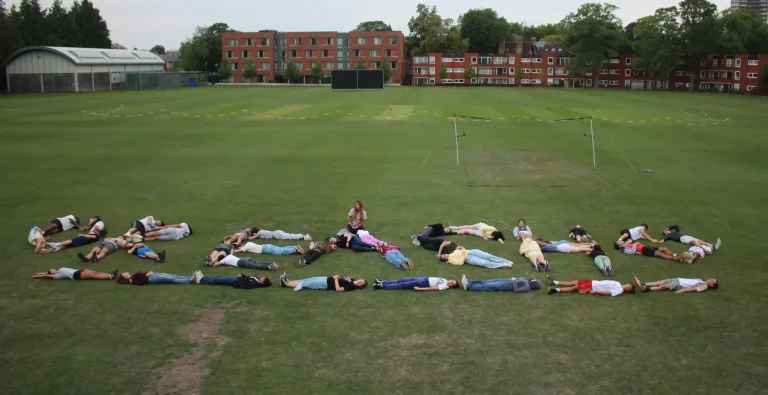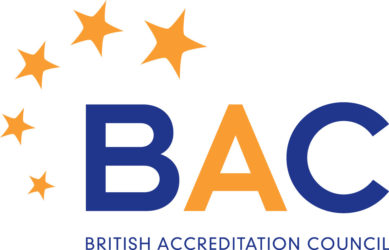This blog provides general information and discussions about health and related subjects. The information and other content provided in this blog, or in any linked materials, are not intended and should not be construed as medical advice, nor is the information a substitute for professional medical expertise or treatment.
If you or any other person has a medical concern, you should consult with your health care provider or seek other professional medical treatment. Never disregard professional medical advice or delay in seeking it because of something that have read on this blog or in any linked materials. If you think you may have a medical emergency, call your doctor or emergency services immediately.
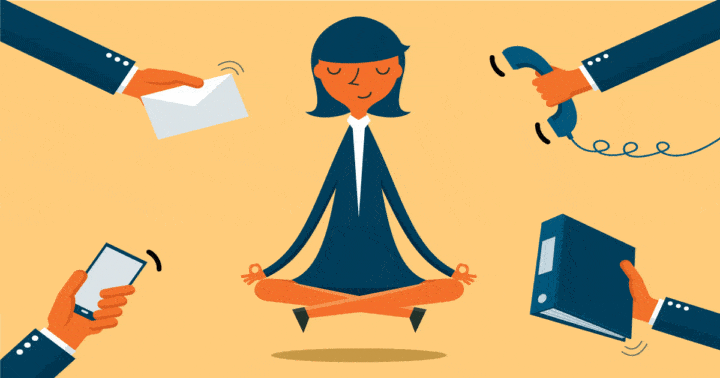
We are surrounded by technology and its increasing demands on our time
If you’re thinking about attending an academic summer school (i.e. voluntarily using your free time to learn more!), chances are you’re a hard worker with bundles of drive and motivation to succeed. This is awesome! At Reach, we always want to encourage our students to work hard and aim for their dreams, whilst also keeping a good balance between work, rest and play.
Maintaining balance can be especially hard as a student, weighing up your options and making big future plans. In the run-up to World Mental Health Day, lots of people online were joining in the conversation to talk about stress and its impact on mental health. In particular, there was much discussion of feeling overwhelmed and burned out. So we thought we’d take a look at the phenomenon of “burnout”, and offer some choice pieces of wisdom people have shared for managing daily stress.
What is burnout?
According to the International Classification of Diseases, burnout is characterised as a ‘syndrome’ often stemming from chronic workplace stress. Stress becomes chronic when it is not successfully managed and becomes a consistent part of your life. Burnout, then, seems to happen when we consistently push beyond our limits and neglect our more basic needs.
Some signs of burnout include:
- feeling completely exhausted (tiredness that won’t go away)
- feeling cynical or negative about what used to motivate you
- decreased productivity and efficiency
- inability to keep up with demands or retain information
Whilst mainly mental and emotional, chronic stress can also have physical outworkings, such as insomnia, shortness of breath, aches and pains, blurred vision, and more. In her book, The Burnout Solution, psychotherapist Siobhan Murray suggests we may be burned out if we’ve noticed creeping bad habits, such as (increased) alcohol consumption or relying on stimulants such as caffeine or sugar to get you through the day.
Slow Burn
Despite what some may argue, burnout is a real condition, with real consequences. Part of what makes burnout sometimes hard to recognise is that it does not happen overnight; in this case, stress is more of a ‘dripping tap’ than a dam breaking. In many cases, sufferers are so used to daily stress that when it finally becomes too much, it catches them unawares.

Burnout often comes from feeling overburdened and as if we cannot switch off
The good news is, the more efficiently we deal with low-level stress, the better chance we stand of recognising signs of burnout, and avoiding it altogether.
What’s more: taking positive steps to reduce your daily stress can give you the opportunity to work more efficiently and successfully than you would have ever imagined possible when you were dealing with stress and fatigue! You will also gift yourself more energy to do fun things you enjoy and aimed towards future success… like coming to a Reach program, for instance!
Here are five popular ways to manage daily stress and avoid burnout…
Switch Off
Stopping to breathe? Sounds a little obvious – even completely useless! We must not forget, though, that stress is a physiological process. When we are facing a mountain of things to do, our stress levels raise our cortisol and adrenaline to help us “fight, flight or freeze.” Mindfulness induces a relaxation response in our parasympathetic nervous system, thereby lowering our heart rate, blood pressure, and muscle tension. If this response is not triggered, our bodies continue in the “fight, flight or freeze” mentality far longer than they should, which can cause physical ailments and eventually lead to burnout.
That’s why it’s important to take regular moments in the day to check in with ourselves. Focus on your breathing for a moment. Remind yourself you’re alive. There are many useful apps available for guiding these practices, such as Calm and Headspace – try a few and see which suits you best.
That being said, while apps can be great, more and more research is showing that a break with our phones may not only be beneficial but necessary to our wellbeing. For many, technology has accelerated the pace of life far beyond our control, leading us to feel overstimulated and overwhelmed. After suffering from exhaustion, pop star Selena Gomez took a 90-day detox from her phone, afterwards calling it ‘the most refreshing, calming, rejuvenating feeling.’

It’s true!
Okay, maybe we’re not at 90-day-detox-level yet. Even so, if you can’t ‘break up’ from your phone just now, baby-steps could include scheduling a select amount of time in your day to literally switch your phone off, go outside, move your body in a way that feels good for you, even just take some deep breaths. If this sounds good to you, chances are that your body – and mind – will thank you!
Time Management
Ever gone to start a task and end up putting it off because it seems so huge?
One of the biggest impediments to productivity is feeling overwhelmed. There are many ways you can use time management skills to combat this, such as breaking your tasks down into smaller chunks and making a schedule. We’ve outlined some ways you could go about practising good time management in our blog on working “smarter, not harder”, which you can read here.

Burnout can cause issues with concentration and retention
In addition to these skills, time management also includes putting up good boundaries and learning to say ‘no’ when things are starting to get too much. YouTube sensation and chat show host Lilly Singh publicly announced a break from making videos in 2018, stating:
“I am mentally, physically, emotionally, and spiritually exhausted. I could be mentally healthier. There’s a lot that I need to address, and I’m not able to [when I am] constantly pumping out content.”
Of course, if we can, we want to avoid burnout by getting in the habit of setting good boundaries before it all gets too much, before we have to take a complete hiatus from our goals. This is yet another good reason to keep balanced: so that nothing stands in the way of our dreams, least of all ourselves.
Take Sleep Seriously
“Sleep is for the weak”… “I’ll sleep when I’m dead”…

Don’t be like Patrick!
We’ve all been there – thinking an all-nighter will help us cram in more study-time or ace a test. But this is a mirage. Regular, good-quality sleep, medics confirm, is crucial to keeping stress at bay and ensuring our bodies are working the way they should in order to cope with life’s daily demands. Indeed, CEO Arianna Huffington, who has been vocal online about her experience of burnout, says:
“Sleep, or how little of it we need, has become a symbol of our prowess… there’s practically no element of our lives that’s not improved by getting adequate sleep. And there is no element of life that’s not diminished by a lack of sleep.”
Suggestions to help those who struggle with sleep often revolve around good ‘sleep hygiene’. This includes making your bedroom a screen-free zone, consecrating an hour before bed for unwinding, and having a regular bedtime. So you can see for yourself that sleep is anything but for the weak – it’s the secret of the strong!
Focus on the Big Picture
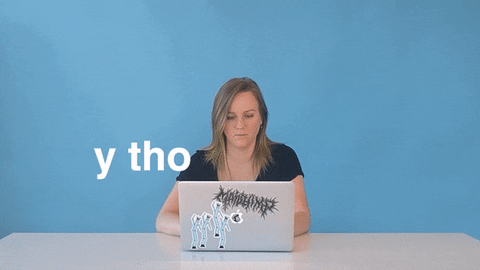
Why though?!
Burnout can cause motivation to wane, but equally, losing sight of the ‘why’ behind the ‘what’ can escalate an already stressed system. That’s why it can constitute good self-care to keep in mind what we’ve achieved so far and why we’re focusing on the main project taking our attention right now. How does it fit into our big picture? This can refer to our life, our future plans, etc.
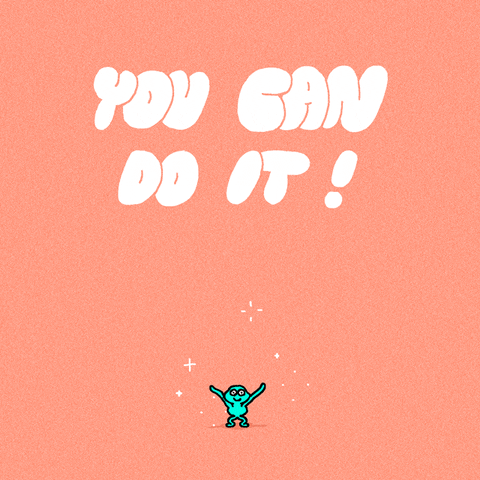
You can do it!
You could also consider, not only the end result you aim to achieve, but how it will make you feel, how you will have grown as a person, in your abilities, your character, your relationships, etc. If you need some help keeping this in mind, why not scribble down some of these goals, and put them somewhere prominent to keep you motivated? Or if you’re really coming unstuck trying to think of them, ask some people who know you well and whose opinion you value to write down a list for you. Looking at this list may help you centre yourself and retain the drive you need to get the job done.
Reach Out
 (The pun was there, we couldn’t help ourselves…)
(The pun was there, we couldn’t help ourselves…)
We can apply this advice in two ways. First, to studying: reach out to someone similarly motivated and see if they’d like to study together. (Perhaps try strictly-observed silence for half an hour, then a ten-minute chat break… or you could test each other on what you’ve learned.) You could also reach out to others to ask them to hold you accountable, telling them your plans in advance so they can help you achieve those goals, whether as a gentle cheerleader or a tough drill-sergeant! This could help you stay focused – plus you know people are rooting for you and wanting you to do well, which always helps.
However, most importantly, if you feel you are struggling with stress – even if you’re not burned out, but beginning to feel a little overwhelmed – it is really important that you reach out to someone: a parent/ guardian, relative, teacher, friend, doctor – anyone who cares about you is a good start. Asking for help is not a sign of weakness – far from it. Feeling stressed or out of control is nothing to be ashamed of, and you deserve maximum support in achieving your goals and in being healthy and happy. If you can’t think of anyone in your life who would understand that or know how to help, there are even hotlines, email services and apps made to bridge that gap. No matter where you are in the world, there is lots of support available. Whatever you choose, you needn’t struggle with burnout, stress or any other mental health concern alone.
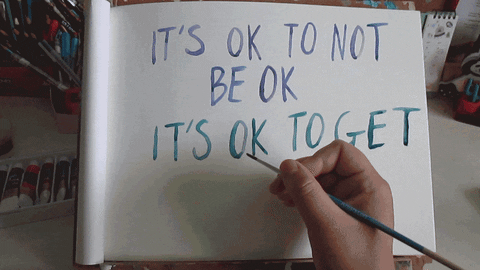
It’s okay to ask for help – you deserve it!
Keep Calm and Study On!
We are rooting for you!

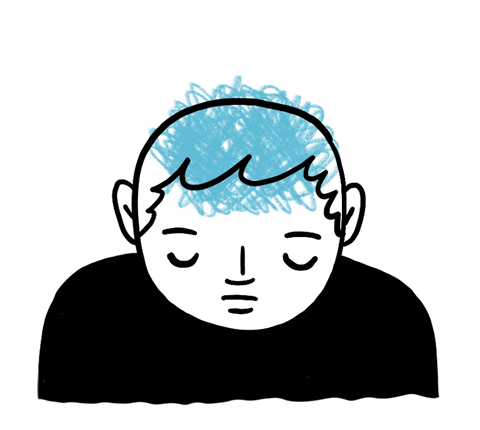
 (The pun was there, we couldn’t help ourselves…)
(The pun was there, we couldn’t help ourselves…)
